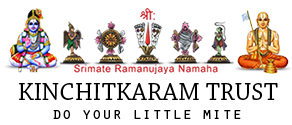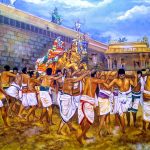Srimathe Ramanujaya Namah:
Let adiyen explain about the case of Durvasa Muni. The case of Durvasa Muni is indeed unique and intriguing within the scriptural traditions, especially when considering the general principle that when a sage or ascetic grants a boon or issues a curse (śāpa), the power of their tapas (austerity) usually diminishes. However, in the case of Durvasa Muni, the opposite seems to occur—his strength and power appear to increase after he curses someone. This apparent anomaly can be understood in several ways based on scriptural interpretations and insights into Durvasa Muni’s nature:
1. **Nature of Durvasa Muni’s Tapas:**
– Durvasa Muni is known for his intense tapas (austerity) and his highly irascible nature. His anger is almost instantaneous and fierce, which is a direct manifestation of the energy accumulated through his tapas. The more he taps into this energy through acts like cursing, the more it seems to replenish or even increase. This can be compared to a reservoir that overflows the more it is drawn from, due to the sheer volume of stored energy.
2. **Divine Sanction and Role:**
– Durvasa Muni is regarded as an incarnation of Lord Shiva or a partial manifestation (amsha) of His anger. This divine origin could mean that his curses are not just personal outbursts but are divinely sanctioned by Sriman Narayana, with a purpose in the cosmic order. Therefore, the curses he issues may be part of a larger divine plan, and instead of diminishing his tapas, they could align him more closely with his divine role, thereby increasing his spiritual potency.
3. **Durvasa’s Unique Nature:**
– Scriptures often portray Durvasa as a unique rishi whose temperament and behavior do not conform to the usual expectations of ascetics. His quick temper is not merely a flaw but a significant aspect of his personality, designed to teach important lessons to others. His tapas is thus of a different quality, where his anger and the resulting curses are integral to his spiritual practice and not a drain on his energy.
4. **The Principle of Divine Will:**
– Another perspective is that Durvasa Muni’s actions are directly influenced by the divine will of Sriman Narayana. In cases where his curses serve a higher purpose or are part of the divine will, his power might not decrease but rather increase, as he is acting in accordance with a divine mandate of Sriman Narayana. This aligns with the belief that the strength of one’s tapas is not just about personal accumulation but also about one’s alignment with divine principles.
Now reg. the question of Jaya/Vijaya’s material enjoyment, it is important to differentiate Kārya Vaikuntha from Nitya Vaikuntha. Nitya Vaikuntha is the eternal, changeless realm, where the Lord eternally resides, and where there is no influence of time, space, or material elements. Kārya Vaikuntha, on the other hand, is a functional, temporary projection for specific divine purposes. Kārya Vaikuntha illustrates the Lord’s compassionate nature in creating a space that connects the divine with the material, allowing His divine will to manifest and interact within the material world.
Jaya and Vijaya, the gatekeepers of Karya Vaikuntha, were cursed by the Four Kumaras to be born on Earth as demons, which led to their incarnations as Hiranyaksha and Hiranyakashipu, Ravana and Kumbhakarna, and Shishupala and Dantavakra. Despite their demonic roles, they experienced significant material power and enjoyment during their earthly lives. This apparent paradox can be understood as follows.
Jaya and Vijaya were not ordinary souls but servants of Sriman Narayana. Their incarnations as demons were part of a divine plan to fulfill the Lord’s lila (divine play). The material enjoyments and power they experienced were essential for the roles they were meant to play in challenging and ultimately showcasing the supremacy of the Lord. Their eventual liberation by Sriman Narayana was predetermined, and their lives were orchestrated to serve His divine purpose.
Now in the case of Jaya / Vijaya, the actual punishment for offending devotees like sanat kumaras is make them to be distanced from Sriman Narayana. The material enjoyments they got is like feeding a diabetics patients with more sweets. The more the material enjoyment the more they are distanced from the Lord. Finally as per the divine will of Sriman Narayana, when it was time, He came and ended their suffering and took back near Him.
In essence, while Jaya and Vijaya experienced material enjoyments, these were part of the divine play and served a higher purpose. Their real suffering lay in being away from the Supreme Being and serving Him in Vaikuntha.
adiyen,
Badrinarayana Ramanuja Dasan.

